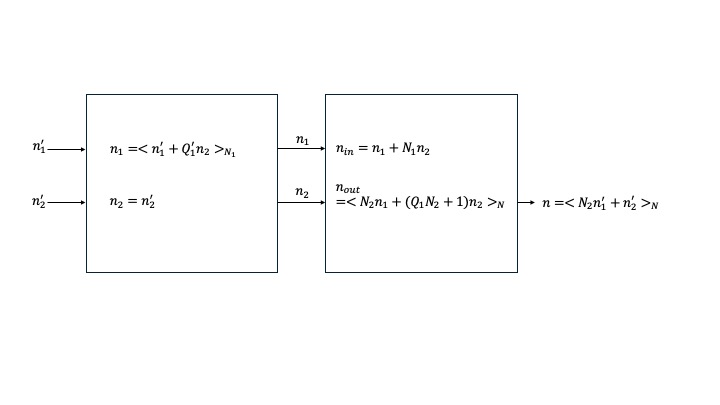N is decomposed into coprime and with the Prime Factor Algorithm.
The parameters needed are calculated using the extended Euclid algorithm, where and :
function extended_euclid(a, b)
@assert a>=0 && b>=0 "a and b must be non-negative"
if a == 0
return (b, 0, 1)
else
(g, y, x) = extended_euclid(mod(b, a), a)
end
(g, x - (b ÷ a) * y, y)
end
(g, M1, M2) = extended_euclid(L, M)
Q1 = -M2
Q2 = -M1
Q1P = mod(L + M2, L)
Q2P = mod(M + M1, M)

mask_mux_mod(a, B) = a - (B & -(a ≥ B))
rhs_n = 1
for n1p = 0:L-1
R1 = 0
for n2p = 0:M-1
n1 = mask_mux_mod(n1p + R1, L)
lhs_n = n1 + L * n2p + 1
@inbounds Y[lhs_n] = X[rhs_n]
R1 = mask_mux_mod(R1 + Q1P, L)
rhs_n += 1
end
end
Prove that with these that:
See lean/pfak2.lean in MinimalFFT.jl repository for proof.
mask_mux_mod(a, B) = a - (B & -(a ≥ B))
lhs_k = 1
for k2p = 0:M-1
R1 = 0
for k1p = 0:L-1
k2 = mask_mux_mod(k2p + R1, M)
rhs_k = k1p + k2 * L + 1
@inbounds Y[lhs_k] = X[rhs_k]
R1 = mask_mux_mod(R1 + Q2P, M)
lhs_k += 1
end
end
[1] A. Wang, J. Bachrach and B. Nikolié, "A generator of memory-based, runtime-reconfigurable 2N3M5K FFT engines," 2016 IEEE International Conference on Acoustics, Speech and Signal Processing (ICASSP), Shanghai, China, 2016, pp. 1016-1020, doi: 10.1109/ICASSP.2016.7471829
[2] Wang, Angie. Ph.D. Dissertation, UC Berkeley. "Agile Design of Generator-Based Signal Processing Hardware," 2018.
[3] C. -F. Hsiao, Y. Chen and C. -Y. Lee, "A Generalized Mixed-Radix Algorithm for Memory-Based FFT Processors," in IEEE Transactions on Circuits and Systems II: Express Briefs, vol. 57, no. 1, pp. 26-30, Jan. 2010, doi: 10.1109/TCSII.2009.2037262